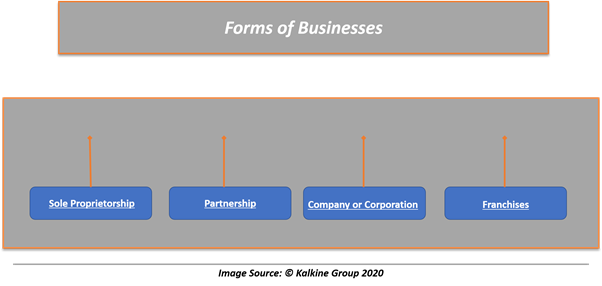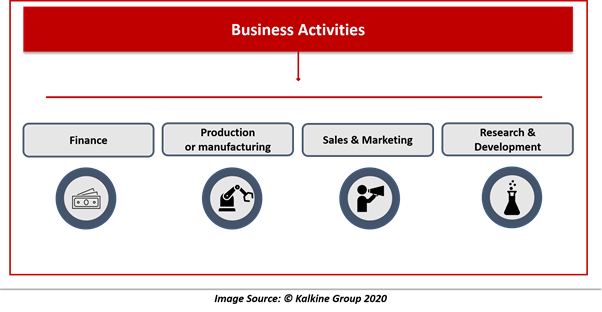What is a business?
Business is derived from the word busyness, which literally means to be occupied. When ‘ness’ is added to some adjectives, the word becomes a noun like sadness, happiness etc. In mainstream culture, business refers to the activity of producing, buying and selling of goods and service for the motive of profit.
Business can include commercial activity, professional services, or industrial activity. Historically, the primary motive of the firms is to earn profits by undertaking any business activity, but scope had increasingly widened to also address social, economic and environmental issues.
It is a collective word and includes a broad range of entities like from a street vendor to Apple Inc. Businesses can be for-profit as well as not-for-profit motives, which mostly includes entities like charitable funds, endowments, government entities etc.
What are the various forms of businesses?
Forms of businesses may differ across jurisdictions and their laws.

Sole Proprietorship
A sole proprietorship has a single owner, who is perhaps the chief decision-maker of the business. A sole proprietor can employ other people to assist for business activities and has unlimited liability for the obligations of the firm.
The person is also the decision-maker in the sole proprietorships and is responsible for overall management activities like capital allocation, budgeting. All assets of the sole proprietorships are owned by the sole proprietor, including machinery, building, equipment etc.
Partnership
A partnership is a business owned by two or more people, and the profits and losses are shared among partners as per the partnership deed between partners. Each partner in the firm contributes to capital and resource to the business.
Further, there are usually three kinds of partnerships, which include Limited Liability Partnerships (LLPs), General Partnerships (GPs), and Limited Partnerships (LPs). This structure of the business is usually adopted by professional services businesses such as lawyers, boutique investment banks, accounting and audit, consultancy etc.
Company or Corporation
A company is a separate legal entity distinct from the owners or shareholders of the business. The owners of the company only have limited liability, but the corporate veil could be lifted, and owners could be held responsible for the acts of the company.
Owners/shareholders of the company form a Board of Directors, which can constitute some member of the shareholder groups, independent persons. The Board of the company is the governing body of the company and is responsible for setting up a management team.
The management team of a company can also include some shareholders like majority owner and is headed by Chief Executive Officer (CEO), who is also a member of the Board of the company. CEO is responsible for operating the business, and the Board supervises the activities of the company.
A company and its shares could be publicly available for trading between parties such companies are known as public companies, whose shares are traded in a stock exchange, such as Nasdaq. Likewise, the companies that do not have their shares listed are called private companies.
Franchises
Franchising is a system of business operations in which small entrepreneurs execute agreements with large companies. Under the agreement, the large company allows the small firm to use its brand, techniques, products, services in return of royalty on revenues.
Franchises are spread across the world and are an important type of business type used to scale up operations of a well-known brand, product or service across jurisdictions. A franchisor is a company that grants a license to uses its products or services, and the other party in the agreement is called Franchisee.
What are the main business activities?

Finance
Finance function in businesses manages overall accounting and finance. It includes maintaining books of accounts, recording accounting transactions, and preparing monthly, quarterly, semi-annual, and annual financial statements.
In large enterprises, the function is headed by a Chief Financial Officer and also includes overall financial management, including investment decisions, performance evaluation, cost-optimisation etc.
Production or manufacturing
It is the most crucial function of any business that derives the ultimate source of revenue of the business being product or service. Production largely requires labour, capital, equipment and techniques to produce the desired output.
Under the production function, the business focuses on maximising its position based on the cost of product or service. It also becomes imperative for a business to produce high-quality goods or services for better customer satisfaction and brand development.
Sales & marketing
Sales and marketing function in the business ensure that products and services are reached to the maximum addressable market. The employees working in this function help the business to fulfil revenue targets.
They are also responsible for taking the brand of the business to new markets and establish a relationship with existing and potential customers. Business development is the primary role of sales and marketing function, along with brand management and development.
Research & development
Research & development is an important function of a business and is crucial for the future growth of the business. The new product development is initiated within the R&D function along with continues testing of ideas.
The intellectual property of a business helps to achieve competitive advantages. R&D function is largely involved in intellectual property development for the business. In addition, the function may also undertake initiatives to improve operational practices of business through the development of new technologies and practices.
 Please wait processing your request...
Please wait processing your request...